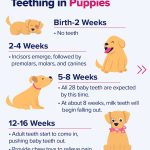Are you ready for a puppy-ful revelation? As any dog parent knows, those adorable little teeth that make your puppy’s grin so irresistible are destined to disappear – but when exactly do they lose their baby chompers?
At What Age Do Puppies Lose Teeth?
The answer might surprise you. Losing baby teeth is a natural part of puppy development, and understanding this process can help you better care for your furry friend’s dental health. In this post, we’ll dive into the world of puppy teething, exploring when and why puppies lose their first set of teeth.
The Process of Puppy Teething
Puppies start losing their baby teeth – also known as deciduous teeth – around 3-4 months old. This process is called “teething,” and it’s a gradual one, with most puppies shedding their last baby tooth by the time they’re about 6-7 months old.
As your puppy grows, their adult teeth begin to emerge from beneath their gumline. It’s a bit like a tiny, furry game of Jenga – as one set of teeth comes out, another takes its place! This transition is crucial for establishing good oral health habits and preventing potential dental problems down the line.
But here’s the thing: not all puppies follow this exact timeline. Factors such as breed, nutrition, and overall health can influence when your pup starts losing their baby teeth. In our next section, we’ll explore these variables in more detail, so you can better understand what to expect from your own puppy’s teething journey.
To further shed light on this fascinating process, let’s dive into some key factors that can influence the timing of puppy teething.
Influencing Factors: Breed, Nutrition, and Health
Breed plays a significant role in determining when puppies lose their baby teeth. Some breeds, like Chihuahuas and Poodles, tend to shed their first set of teeth earlier than others, around 2-3 months old. Larger breeds, such as Labradors and German Shepherds, may take a bit longer, losing their baby teeth between 4-6 months.
Nutrition also has an impact on the teething process. Puppies that receive high-quality, nutrient-rich food from an early age tend to develop stronger jaw muscles, which can lead to earlier tooth loss. On the other hand, puppies that are fed a diet lacking essential nutrients may experience delays in their teething journey.
Health also plays a crucial role in determining when puppies lose their baby teeth. Puppies born with dental or gum issues may require more time for their adult teeth to develop and emerge. Conversely, healthy puppies without any oral complications tend to follow the average timeline for tooth loss.
It’s essential to remember that every puppy is unique, and their teething process can be influenced by a combination of these factors. As you monitor your pup’s dental development, keep an eye out for signs of discomfort or pain during this stage, such as excessive drooling, irritability, or loss of appetite.
For more information on caring for your puppy’s oral health and teething needs, be sure to check out the American Kennel Club’s Puppy Teething 101 article. By understanding your pup’s unique teething timeline and providing proper care, you’ll set them up for a lifetime of healthy, happy smiles.
Conclusion
In this section, we’ve explored the fascinating world of puppy teething, delving into the process itself and the various factors that can influence its timing. In our next post, we’ll be discussing some practical tips and tricks for managing your pup’s teething discomfort and ensuring their oral health remains top-notch.
Get Expert Advice on Dog Care
Are you concerned about your puppy’s teething process? Our expert dog care consultants are here to guide you through the entire process, from weaning to adult teeth.
Get Expert AdviceAs we’ve explored, puppies typically start losing their baby teeth around 3-4 months old, with most shedding their last tooth by the time they’re 6-7 months old.
Key Takeaways
Here’s a quick recap of what we’ve covered so far:
- Puppies start losing their baby teeth (deciduous teeth) around 3-4 months old
- This process is called teething and is a gradual one, with most puppies shedding their last baby tooth by the time they’re about 6-7 months old
- Factors such as breed, nutrition, and overall health can influence when your pup starts losing their baby teeth
Final Insights
As you embark on this exciting journey with your puppy, remember that every pup is unique, just like a snowflake. Be patient and keep an eye out for signs of teething, such as increased chewing and whining.
By understanding the process of puppy teething, you’ll be better equipped to provide your furry friend with the best possible care and set them up for a lifetime of healthy smiles.
A Satisfying Conclusion
As you watch your puppy’s baby teeth disappear, take comfort in knowing that this is just one small part of their incredible growth and development. With patience, love, and proper care, your pup will blossom into a happy, healthy adult dog – ready to take on the world with a confident grin.
Burning pain in chest when coughing: Have you ever experienced a burning sensation in your chest when you cough? Find out what’s causing this uncomfortable symptom and how to alleviate it! [Read More](https://deltaconnect.info/burning-pain-in-chest-when-coughing/)
Ask a CPA a question online free: Need financial advice from a certified professional? Learn how to get expert guidance without breaking the bank! [Read More](https://deltaconnect.info/ask-a-cpa-a-question-online-free/)



